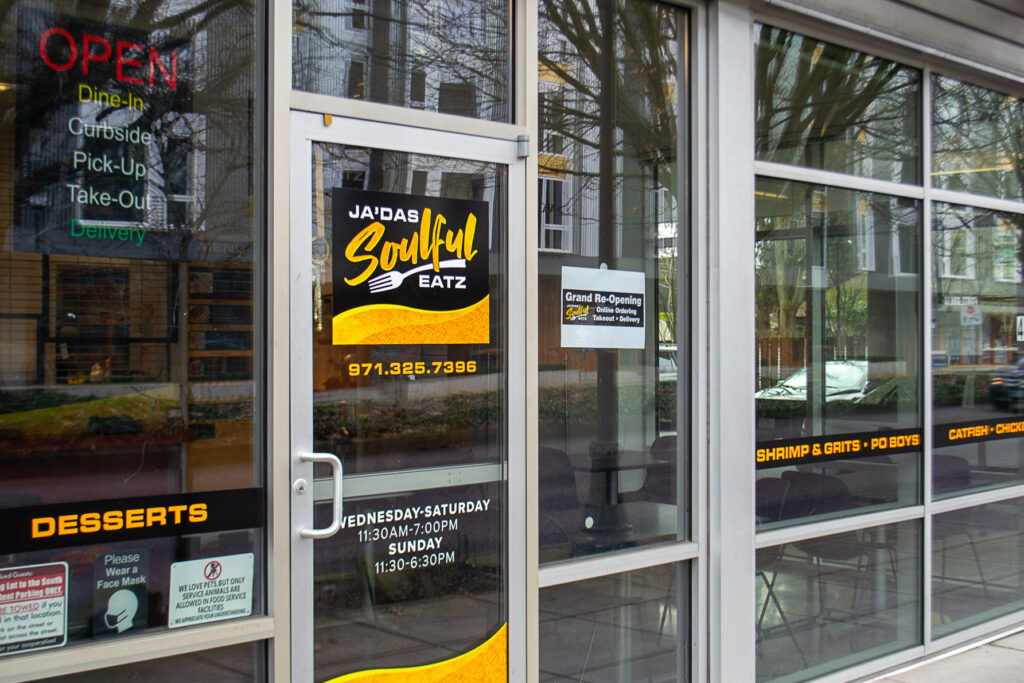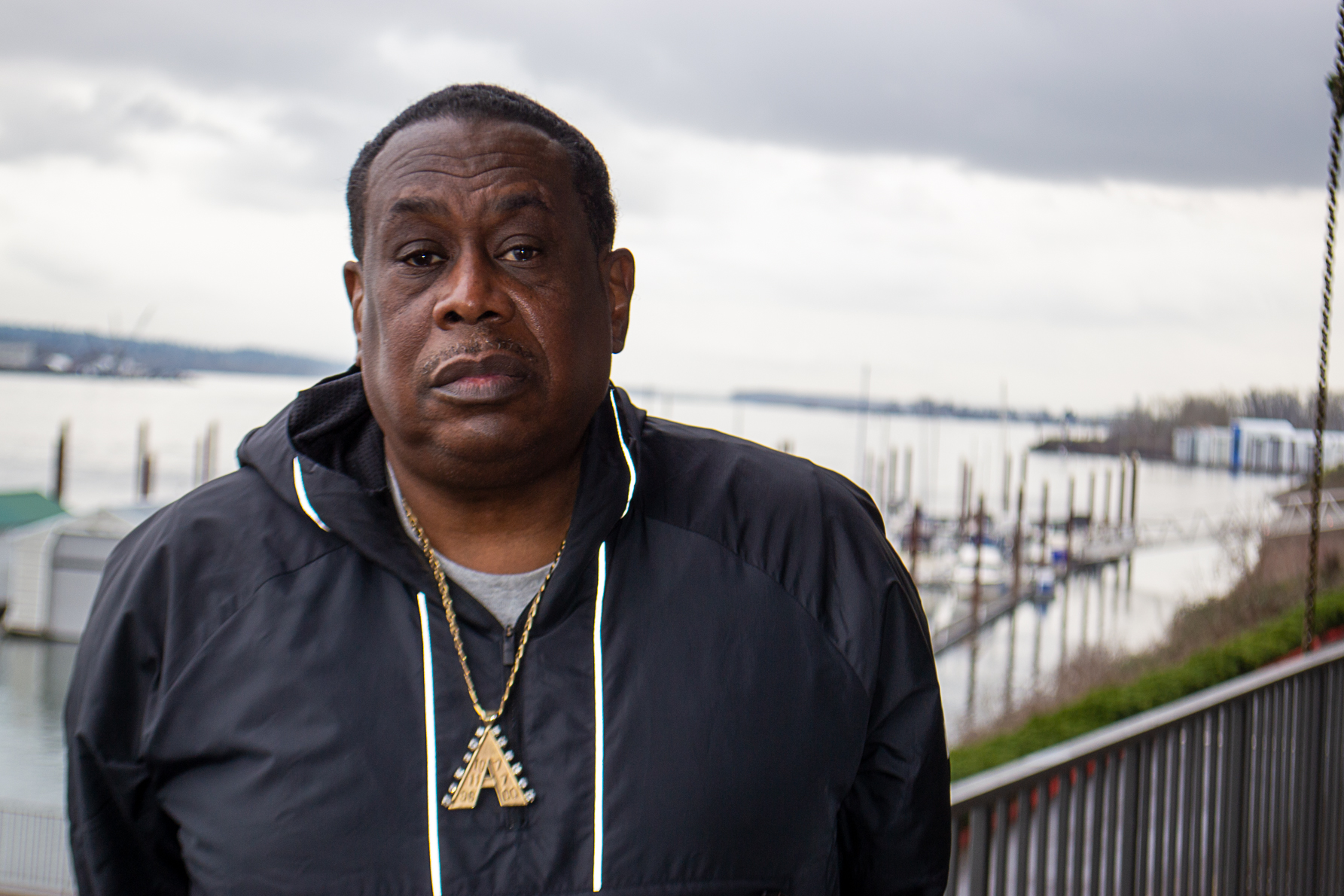Photos by Mac Smiff
There’s a grassroots effort to get old felony records pardoned and sealed so people “living their best life” can move on with their lives.
WOHM met up with Larry Turner at Ja’das Soulful Eatz, his wife’s eatery on Northeast Martin Luther King Blvd, in Portland, Oregon. Turner is an ambassador for the Black Oregonian Pardon Project, an initiative of the Criminal Justice Reform Clinic at Lewis & Clark Law School. Thanks to the Clinic’s pro-bono assistance — Turner received a pardon from Oregon Governor Kate Brown in 2021 — he’s now organizing to help other Black Oregonians do the same.
“These are people who have started mental health programs, nonprofits, businesses, they’re not just helping their own lives but helping the lives of others as well — so getting that pardon can help them further expand that work,” Turner told WOHM.
Since getting out of prison in 1996, Turner has worked extensively with formerly incarcerated people in Oregon, as a drug and alcohol counselor, and with numerous social service agencies. In 2007 he co-founded Fresh Out Community Based Re-entry Program to help formerly incarcerated African American Oregonians avoid returning to jail or prison.
It’s no secret that Black Oregonians are disproportionately incarcerated in the state; African Americans are imprisoned at a rate almost four times that of white people. “We get the least representation in the legal system and the most participation. That’s why our community calls the ‘justice system’ the ‘just us system,’” Turner told WOHM.
Turner’s felony record, originally stemming from a 1981 conviction, made it hard for him to get jobs, find housing, access loans, and limited his now-prolific advocacy by disqualifying him from working with youth in Portland Public Schools. He once got a job as a juvenile parole officer but had the offer rescinded after he failed the background check. Now that he has been pardoned, he has the option of getting a government job, running for public office, and owning a gun for self-defense.
The 2022 Black Oregonian Pardon Project is representing people who were all released from prison approximately 10 years ago, have had no incidents since being released, have a non-expungeable felony conviction that is holding them back, and are “living their best life,” according to Aliza Kaplan, Director of the Criminal Justice Reform Clinic.
Turner’s non-expungeable felony was a Robbery in the First Degree charge. “I was drug involved, in order to get drugs I would steal, so I had a long record,” he told WOHM. Turner told WOHM he rarely speaks about his conviction history, but felt the need to, “to begin to break the social stigma” associated with having a criminal record.
“These days a serious conviction on your record even if you have served your time and it was 10 or 20 years ago, makes it difficult or impossible to rent or buy a home, get a job and certain professional licenses, go to child’s school to volunteer, etc.,” Kaplan told WOHM. “The punishment never ends.”
The Black Oregonian Pardon Project is assisting people with non-expungeable felony records. (More serious felonies are not expungeable. Thanks to the 2019 reform, people with these felony records now have a meaningful mechanism to help them move on with their lives.)
Liz Merah, Press Secretary for Governor Kate Brown told WOHM that, “Similar to her stance on granting commutations, Governor Brown believes that granting pardons is an extraordinary act that should be reserved for individuals in exceptional circumstances or those who have made incredible changes and are dedicated to making their communities better. She evaluates pardon applications on a case-by-case basis and considers a variety of factors about the applicant’s history and case when making those decisions.”
‘A domino effect of positivity‘
Jamar Summerfield is another ambassador for the Black Oregonian Pardon Project. He also received a pardon with the Clinic’s help. Summerfield told WOHM that, “restorative justice is more than a Black issue, it’s on society to help out with that, because when a person has paid their debt to society, they should be able to come back to society with a clear lane, not with all these land mines.”
These pardons change people’s lives, says Summerfield, who has worked with Metropolitan Public Defenders to help get eligible records expunged. Some of the people he helped have themselves gone on to help others do the same, he says.
“It’s a domino effect of positivity,” says Summerfield, of the Black Oregonian Pardon Project.

An important 2019 reform
Turner and Summerfield were among the first beneficiaries of a 2019 Oregon reform (SB 388) that has made pardons more meaningful by pegging them — for the first time — to the actual sealing of records. Before the law was passed, people who received pardons in Oregon would receive certificates from the state, but would not gain all the benefits of a pardon, because their record would still show up on background checks.
The 2019 reform retroactively sealed the records for people who received pardons after June 13, 2014. (People who received pardons before June 2014 can request the Governor initiate the process of sealing the records related to their pardoned conviction.)
The Black Oregonian Pardon Project is working on new pardons.
Oregon’s historical use of the pardon
Oregon governors in the early 1900s “annually pardoned substantial percentages of the Oregon prison population,” according to a Lewis & Clark Law Review paper co-authored by Kaplan. At the time, there was an understanding among judges and juries that if they made a mistake, governors would step in with a pardon to make things right. The pardon power provided a “vital correction on the justice system that produced unfair and unnecessarily harsh outcomes,” the paper reads.
“Historically it was used all the time here in Oregon and in every state to show mercy, forgiveness, address mistakes, and to undo bad policy, and it was done by governors of both political parties and supported by district attorneys and the community,” Kaplan told WOHM.
Then the 1980s and 1990s and the “war on drugs” happened.
The power of judges to use their discretion was gutted by mandatory minimum sentencing laws like Oregon’s notorious pro-incarceration Measure 11 and parole was abolished by Oregon’s 1989 Sentencing Reform Act. These “tough on crime” laws made harsh sentences mandatory and made getting out of prison for good behavior exceedingly difficult.
“Use of the pardon power essentially ground to a halt due in part to the nationwide ‘tough on crime’ policies of punishment and sentencing that took effect in Oregon,” according to Kaplan’s paper. With the standardization of the criminal justice system also came heightened respect — among people in power — for plea deals, which had previously been viewed as “corrupt.” All of this led to the declining use of the pardon.
Now, as criticism of mass incarceration heightens, pressure is mounting on governors to return to the liberal use of the pardon. “It is and should be used regularly because it is part of our criminal legal system,” Kaplan told WOHM.
Use of the pardon, clemency, and commutation has slowly increased under Governor Brown. Along with commutations for some people vulnerable to COVID-19, Governor Brown has shortened sentences for some incarcerated firefighters and people convicted as minors.
“Since its creation, our criminal justice system has produced unjust outcomes, particularly for Black and brown communities,” Merah, Press Secretary for Governor Kate Brown, told WOHM. “While not a replacement for comprehensive criminal justice reform, the Governor recognizes that executive clemency powers are an important tool in addressing systemic failures in our criminal justice system while we work to make long-term change. Since taking office in 2015, Governor Brown has granted pardons to 60 individuals (73% male, 15% Black, 12% Latino).”

Expanding access to getting pardoned in Oregon
“I needed an attorney [to get pardoned],” Turner told WOHM at Ja’das Soulful Eatz. “It’s a barrier to people who don’t have the money to get an attorney.”
“As far as I know there are no resources for people applying for clemency. We are the only clemency project in the state and we provide legal services to folks seeking all kinds of clemency [including pardons] at no cost,” Kaplan told WOHM.
The Black Oregonian Pardon Project is a specific project aimed at getting 80-100 folks pardoned before Governor Brown leaves office. “It is our understanding that the Governor is open to receiving this group clemency (of 100 cases),” Kaplan wrote in an email.
“Depending who the next governor is, I would love to create the capacity and get the resources for the clinic to continue working on the project,” wrote Kaplan.

